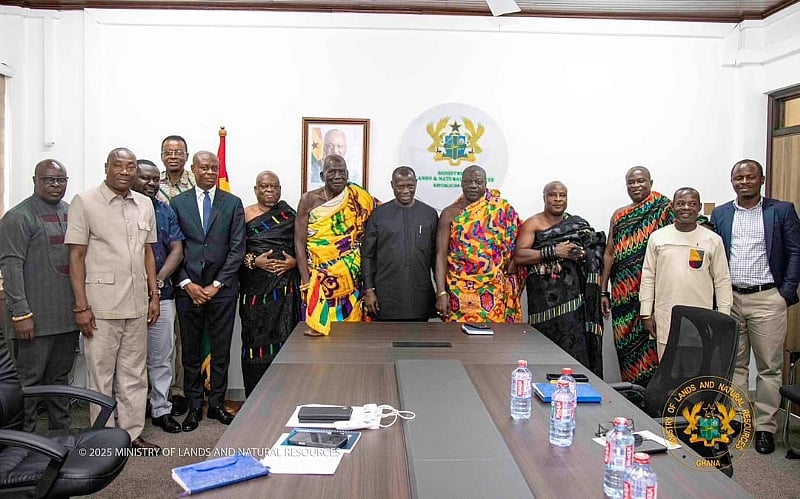The Ewoyaa Lithium Project, located in the Central Region of Ghana, has become a focal point of concern for traditional leaders and government officials alike. A delegation of chiefs representing the Mankessim, Nkusukum, Abura, Dominase, and Ogua traditional areas recently met with the Minister of Lands and Natural Resources, Mr. Emmanuel Armah-Kofi Buah, to address the project’s persistent delays. Osagyefo Amanda Edu IV, the Omanhene of Mankessim, voiced the collective anxieties of the traditional leaders, highlighting the significant downturn in global lithium prices, which have plummeted from $4,000 per tonne in 2022 to a mere $800 per tonne currently. This price volatility adds urgency to the need for the project’s commencement, as further delays could erode the project’s economic viability and diminish its potential benefits for the region. The chiefs emphasized the importance of the project for their communities and expressed frustration over the bureaucratic hurdles preventing its progress.
The primary obstacle, despite the Minerals Commission granting a moratorium in December 2023, is the pending parliamentary ratification. This legislative holdup has effectively stalled the project, leaving approximately 2,000 hectares of land fallow for the past 16 months. This inactivity has directly impacted local farmers, who have been unable to cultivate their land and generate income, creating economic hardship within the affected communities. The traditional leaders emphasized that the necessary preliminary steps, including compensation negotiations and the establishment of a resettlement committee, have been diligently followed. However, these efforts have been undermined by regulatory bottlenecks, creating a sense of stagnation and uncertainty surrounding the project. The Omanhene of Mankessim appealed to the Minister to prioritize resolving these outstanding issues to pave the way for the project’s launch and unlock its potential benefits.
Responding to the chiefs’ concerns, Mr. Buah assured them of the government’s unwavering commitment to addressing the challenges hindering the project’s progress. He acknowledged the urgency of the situation and pledged to work diligently to overcome the bureaucratic obstacles that have stalled the initiative. This commitment signals the government’s recognition of the project’s strategic importance, not only for the local communities but also for the nation’s economic development. Lithium is a critical component in the production of batteries for electric vehicles and other technologies, placing Ghana in a potentially advantageous position within the global market for this increasingly valuable resource.
Mr. Sulemana Yusif, the deputy minister, echoed the Minister’s assurances, reinforcing the government’s dedication to fulfilling its promises regarding the Ewoyaa Lithium Project. He acknowledged the validity of the chiefs’ concerns and reiterated the need for swift action. Mr. Yusif specifically highlighted the importance of expedited engagement with the Minerals Income Investment Fund and Parliament to secure the timely ratification of the project. This targeted approach demonstrates a focused effort to overcome the specific legislative hurdle preventing the project’s advancement. The deputy minister’s emphasis on collaboration between government bodies suggests a concerted effort to streamline the approval process and avoid further delays.
The combined assurances of the Minister and the deputy minister signify a renewed impetus to revitalize the Ewoyaa Lithium Project. The government appears to recognize the project’s potential to create jobs, generate revenue, and contribute to the country’s overall economic growth. Moreover, the successful implementation of the project could establish Ghana as a key player in the global lithium market, further diversifying the nation’s economy and reducing its reliance on traditional exports. The government’s commitment to resolving the outstanding issues suggests a recognition of the urgency of the situation, driven by the declining lithium prices and the economic hardship being experienced by the affected communities.
The Ewoyaa Lithium Project represents a significant opportunity for Ghana to capitalize on the growing demand for critical minerals essential for the global transition to cleaner energy technologies. The project’s successful implementation, however, hinges on the government’s ability to navigate the complex regulatory landscape and address the legitimate concerns of the local communities. The recent meeting between the traditional leaders and government officials signifies a positive step towards resolving the impasse and paving the way for the project’s timely commencement. The collaborative approach adopted by the government, coupled with the active involvement of the traditional leaders, offers hope that the Ewoyaa Lithium Project can finally move forward and deliver the anticipated benefits for all stakeholders.














